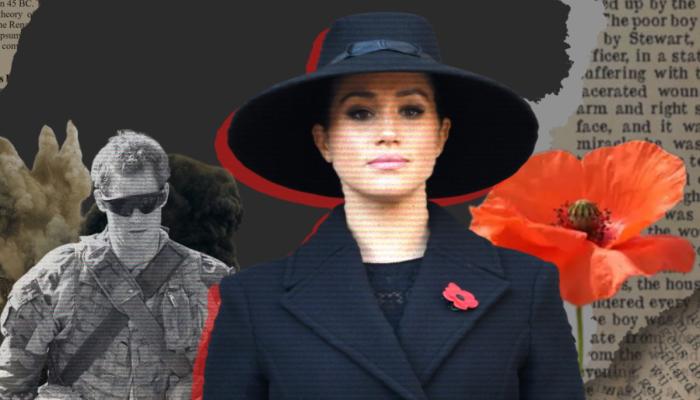Meghan Markle's Remembrance Day post is a love letter to the Empire
Harry’s tours in Afghanistan are framed, even now, as noble service. But what did that service look like from the other side?
On her polished Instagram feed, Meghan Markle posted a video of Prince Harry in Afghanistan, running off mid-interview, all dust and duty. “Once served. Always serving,” the caption reads, as though war were a vocation of tenderness.
It’s Remembrance Day in Canada. Poppies bloom on lapels, trumpets sigh, and words like honour and sacrifice float over a century of blood. The ceremonies are neat, contained, almost cinematic. But somewhere, far from the polished marble of remembrance, the people who once lived beneath those helicopters are still counting their dead.
Harry’s tours in Afghanistan are framed, even now, as noble service. But what did that service look like from the other side? From the ground where wedding processions turned to body parts? From the classrooms where children learned the vocabulary of drones before they learned the alphabet?
In Spare, he calls the men he killed “chess pieces.” The world applauds his candour. But what kind of world is this, where confession becomes content, and killing becomes a lesson in courage?
Markle’s tribute is not an act of remembrance. It is an act of forgetting, performed in high-definition. She posts her devotion to the soldier while Palestinians suffer in real time. For two years, as the bombs fell and the hospitals collapsed, she said nothing.
What does it mean to commemorate war while a genocide unfolds before our eyes? To thank those who “served” in the very machinery that perfected the art of occupation? Western remembrance has always been a selective kind of grief, an elegy that stops at the borders of empire. It remembers its soldiers, never its victims. It weeps for the fallen, never for the ones they made fall.
The red poppy is supposed to symbolize peace. But peace cannot grow in soil soaked with selective mourning. It cannot bloom in timelines where the dead are filtered out for aesthetic consistency.
Maybe that is what remembrance has become, a performance of empathy without consequence. The soldier is remembered, the civilian erased. The drone pilot is honoured, the child he killed unnamed.
And the Duchess, with her perfect lighting and captioned love, tells the world she too remembers, though she remembers nothing at all.
If remembrance were real, it would begin with an apology. It would name the villages burned, the hospitals flattened, the borders redrawn. It would hold in its mouth the taste of Afghan dust, Iraqi ash, Gazan smoke.
“Once served. Always serving,” she writes. Perhaps she is right. The war never ended, it only changed its name, its coordinates, and its hashtags. And those who once served now serve again, this time, the empire of forgetting.
Because remembrance, as the West performs it, is not about peace, but continuity. About the right to remember selectively and therefore to keep killing without interruption.
The veterans of yesterday are the policymakers of today. The weapons tested in Kandahar reappear in Rafah. The same hands that salute the fallen write cheques to arms manufacturers. Every commemoration becomes a rehearsal for the next war.
Meanwhile, the children of those “liberated” lands grow up under skies that never stop humming. They do not have remembrance days. They have anniversaries of invasion, checkpoints, ration lines. Their memorials are piles of rubble.
If there is anything worth remembering, perhaps it is this: the dead do not need our ceremonies. They need our refusal to look away, to glorify, to turn killing into legacy.
Remembrance must be reclaimed from those who weaponized it. From the duchesses and dukes of curated empathy. From those who can grieve only in one direction. It must belong again to the people who never picked up a gun, who still light candles not for victory but for survival.
Until then, every poppy pinned to a chest will be a petal torn from someone else’s grave.
RELATED: Meghan Markle honour Prince Harry's military past in Remembrance Day post
